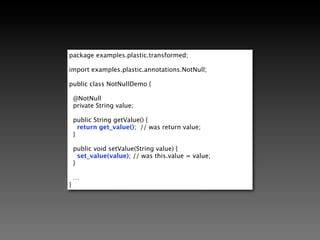Have Your Cake and Eat It Too: Meta-Programming Techniques for Java
- 1. Have Your Cake And Eat It Too: Meta- Programming Java Howard M. Lewis Ship
- 2. A Desperate Last Ditch Effort To Make Java Seem Cool
- 3. Ease of Meta Programming
- 5. Code Reuse
- 7. Boilerplate
- 9. <p> <input type="text" size="10" id="v1"> * <input type="text" size="10" id="v2"> <button id="calc">=</button> <span id="result"><em>none</em></span> </p> <hr> <p> mult() invocations: <span id="count">0</span> </p> var count = 0; function mult(v1, v2) { $("#count").text(++count); return v1 * v2; }
- 10. $(function() { $("#calc").click(function() { var v1 = parseInt($("#v1").val()); var v2 = parseInt($("#v2").val()); $("#result").text(mult(v1, v2)); }); });
- 11. function |ˈfə ng k sh ən| noun A function, in a mathematical sense, expresses the idea that one quantity (the argument of the function, also known as the input) completely determines another quantity (the value, or the output).
- 12. function memoize(originalfn) { var invocationCache = {}; return function() { var args = Array.prototype.slice.call(arguments); var priorResult = invocationCache[args]; if (priorResult !== undefined) { return priorResult; } Danger! var result = originalfn.apply(null, arguments); invocationCache[args] = result; return result; }; } mult = memoize(mult);
- 14. Clojure (defn memoize "Returns a memoized version of a referentially transparent function. The memoized version of the function keeps a cache of the mapping from arguments to results and, when calls with the same arguments are repeated often, has higher performance at the expense of higher memory use." {:added "1.0" :static true} [f] (let [mem (atom {})] (fn [& args] (if-let [e (find @mem args)] (val e) (let [ret (apply f args)] (swap! mem assoc args ret) ret)))))
- 15. Python def memoize(function): cache = {} def decorated_function(*args): if args in cache: return cache[args] else: val = function(*args) cache[args] = val return val return decorated_function Ruby module Memoize def memoize(name) cache = {} (class<<self; self; end).send(:define_method, name) do |*args| unless cache.has_key?(args) cache[args] = super(*args) end cache[args] end cache end end http://programmingzen.com/2009/05/18/memoization-in-ruby-and-python/
- 16. Java?
- 19. ❝Java is C++ without the guns, knives, and clubs❞ James Gosling
- 20. ❝JavaScript has more in common with functional languages like Lisp or Scheme than with C or Java❞ Douglas Crockford
- 21. Oracle owns this Source Executable Compiler Bytecode Hotspot Code Native Code
- 22. AspectJ Source Compiler Bytecode Code AspectJ Weaver Aspects and Pointcuts Executable Bytecode Hotspot Native Code http://www.eclipse.org/aspectj/
- 23. Not targeted on any specific class or method public abstract aspect Memoize pertarget(method()){ HashMap cache = new HashMap(); String makeKey(Object[] args) { String key = ""; for (int i = 0; i < args.length; i++) { key += args[i].toString(); The key is formed from the if (i < (args.length - 1)) { toString() values of the parameters. Ick. key += ","; } } return key; } abstract pointcut method(); Object around(): method() { String key = makeKey(thisJoinPoint.getArgs()); if (cache.containsKey(key)) { return cache.get(key); } else { Object result = proceed(); cache.put(key,result); return result; } } } http://www.jroller.com/mschinc/entry/memoization_with_aop_and_aspectj
- 24. Extend Memoize to apply to specific classes & methods public aspect MemoizeFib extends Memoize { pointcut method(): call(int Test.fib(int)); } Identify method(s) to be targeted by Aspect
- 25. Tapestry Plastic
- 26. Rewrite simple classes on Bytecode the fly Manipulation Java Meta- Central code path for all Programming instantiations Trinity Component Annotations Architecture Identify which classes/ methods/fields to change
- 27. ASM 3.3.1 • Small & Fast • Used in: • Clojure • Groovy • Hibernate • Spring • JDK
- 28. Interface ClassVisitor Byte Class Class .class file Adapters code as Reader Writer byte[] Read / Invoke Invoke Produce Analyze API API
- 29. Reader: parse bytecode, invoke methods on ClassVisitor ClassReader reader = new ClassReader("com.example.MyClass"); ClassWriter writer = new ClassWriter(reader, 0); ClassVisitor visitor = new AddFieldAdapter(writer, ACC_PRIVATE, "invokeCount", "I"); reader.accept(visitor, 0); Adaptor: Sits between Reader & Writer byte[] bytecode = writer.toByteArray(); Writer: methods construct bytecode
- 30. Most methods delegate to ClassVisitor public class AddFieldAdapter extends ClassAdapter { private final int fAcc; private final String fName; private final String fDesc; public AddFieldAdapter(ClassVisitor cv, int fAcc, String fName, String fDesc) { super(cv); this.fAcc = fAcc; this.fName = fName; this.fDesc = fDesc; } @Override public void visitEnd() { FieldVisitor fv = cv.visitField(fAcc, fName, fDesc, null, null); if (fv != null) { fv.visitEnd(); } "Simulate" a field read from the input class cv.visitEnd(); after everything else } }
- 31. Client Code Plastic API ASM Total Encapsulation
- 32. Original Transformed Bytecode Bytecode Plastic Class Transformed .class file Loader Class PlasticClass
- 33. Standard Class Standard .class file Loader Class Plastic Class Transformed Loader Class
- 35. Standard Class Standard Loader Class Plastic Class Transformed Loader Class ClassCastException: org.apache.tapestry5.corelib.components.Grid can not be cast to org.apache.tapestry5.corelib.components.Grid
- 36. Performs transformations on PlasticClass Plastic Manager Delegate Which classes are transformed (by package) Plastic Access to ClassInstantiator Manager Plastic ClassLoader
- 37. public class PlasticManager { For instantiating existing components public ClassLoader getClassLoader() { … } public <T> ClassInstantiator<T> getClassInstantiator(String className) { … } public <T> ClassInstantiator<T> createClass(Class<T> baseClass, PlasticClassTransformer callback) { … } public <T> ClassInstantiator<T> createProxy(Class<T> interfaceType, PlasticClassTransformer callback) { … } … } For creating proxies and other objects public interface PlasticClassTransformer { void transform(PlasticClass plasticClass); }
- 38. public interface AnnotationAccess { <T extends Annotation> boolean hasAnnotation(Class<T> annotationType); <T extends Annotation> T getAnnotation(Class<T> annotationType); } PlasticClass PlasticField PlasticMethod
- 40. Method Advice public class EditUser { @Inject private Session session; @Propery private User user; Advise method to @CommitAfter manage transaction void onSuccessFromForm() { commit session.saveOrUpdate(user); } } void onSuccessFromForm() { try { session.saveOrUpdate(); commit-transaction(); } catch (RuntimeException ex) { rollback-transaction(); throw ex; } }
- 41. Introduce Method public interface PlasticClass { Set<PlasticMethod> introduceInterface(Class interfaceType); PlasticMethod introduceMethod(MethodDescription description); PlasticMethod introduceMethod(Method method); PlasticMethod introducePrivateMethod(String typeName, String suggestedName, String[] argumentTypes, String[] exceptionTypes); public interface PlasticMethod { … PlasticMethod addAdvice(MethodAdvice advice);
- 42. Define an annotation Create a worker for the annotation Apply annotation to class Test transformed class
- 43. MethodInvocation public interface MethodAdvice { void advise(MethodInvocation invocation); } • Inspect method parameters • Override method parameters • Proceed • Inspect / Override return value • Inspect / Override thrown checked exception
- 44. public class CommitAfterWorker implements ComponentClassTransformWorker2 { private final HibernateSessionManager manager; private final MethodAdvice advice = new MethodAdvice() { Shared Advice … }; public CommitAfterWorker(HibernateSessionManager manager) { this.manager = manager; } public void transform(PlasticClass plasticClass, TransformationSupport support, MutableComponentModel model) { for (PlasticMethod method : plasticClass.getMethodsWithAnnotation(CommitAfter.class)) { method.addAdvice(advice); } } } Advice object receives control when method invoked
- 45. Traditional Java Compilation … time passes … Runtime
- 46. With Transfomations Compilation Transformation Runtime
- 47. MethodInvocation Method Advice getParameter(int) : Object getInstance(): Object Advised proceed() … Method private final MethodAdvice advice = new MethodAdvice() { public void advise(MethodInvocation invocation) { try { invocation.proceed(); To the method OR next advice // Success or checked exception: manager.commit(); } catch (RuntimeException ex) { manager.abort(); throw ex; } } };
- 48. Layering of Concerns MethodInvocation Method Advice getParameter(int) : Object getInstance(): Object Advised proceed() … Method Logging proceed() Security proceed() Caching proceed() Transactions proceed() Advised Method
- 49. public class MemoizeAdvice implements MethodAdvice { private final Map<MultiKey, Object> cache = new HashMap<MultiKey, Object>(); public void advise(MethodInvocation invocation) { MultiKey key = toKey(invocation); Not thread safe if (cache.containsKey(key)) { invocation.setReturnValue(cache.get(key)); return; } invocation.proceed(); invocation.rethrow(); cache.put(key, invocation.getReturnValue()); Memory leak } private MultiKey toKey(MethodInvocation invocation) { Object[] params = new Object[invocation.getParameterCount()]; for (int i = 0; i < invocation.getParameterCount(); i++) { params[i] = invocation.getParameter(i); } Assumes parameters are return new MultiKey(params); immutable, implement } } equals() and hashCode()
- 51. @Target(ElementType.TYPE) @Retention(RetentionPolicy.RUNTIME) @Documented public @interface ImplementsEqualsHashCode { } @ImplementsEqualsHashCode public class EqualsDemo { private int intValue; private String stringValue; public int getIntValue() { return intValue; } public void setIntValue(int intValue) { this.intValue = intValue; } public String getStringValue() { return stringValue; } public void setStringValue(String stringValue) { this.stringValue = stringValue;! } }
- 52. public class EqualsDemo { private int intValue; private String stringValue; public int getIntValue() { return intValue; } public void setIntValue(int intValue) { this.intValue = intValue; } public String getStringValue() { return stringValue; } public void setStringValue(String stringValue) { this.stringValue = stringValue;! } public int hashCode() { int result = 1; result = 37 * result + new Integer(intValue).hashCode(); result = 37 * result + stringValue.hashCode(); return result; } }
- 53. Worker public class EqualsHashCodeWorker { … Object instance = …; Object fieldValue = handle.get(instance); @ImplementsEqualsHashCode public class EqualsDemo { FieldHandle private int intValue; get(Object) : Object set(Object, Object) : void private String stringValue; … }
- 54. public class EqualsHashCodeWorker implements PlasticClassTransformer { … public void transform(PlasticClass plasticClass) { if (!plasticClass.hasAnnotation(ImplementsEqualsHashCode.class)) { return; } … } }
- 55. List<PlasticField> fields = plasticClass.getAllFields(); final List<FieldHandle> handles = new ArrayList<FieldHandle>(); for (PlasticField field : fields) { handles.add(field.getHandle()); } FieldHandle get(Object) : Object set(Object, Object) : void
- 56. private MethodDescription HASHCODE = new MethodDescription("int", "hashCode"); private static final int PRIME = 37; Add a new method to the class with a default empty implementation plasticClass.introduceMethod(HASHCODE).addAdvice(new MethodAdvice() { public void advise(MethodInvocation invocation) { … } });
- 57. public void advise(MethodInvocation invocation) { Object instance = invocation.getInstance(); int result = 1; for (FieldHandle handle : handles) { Object fieldValue = handle.get(instance); if (fieldValue != null) result = (result * PRIME) + fieldValue.hashCode(); } invocation.setReturnValue(result); // Don't proceed to the empty introduced method. }
- 58. No Bytecode Required * * For you @ImplementsEqualsHashCode public class EqualsDemo { private int intValue; private String stringValue; … public int hashCode() { return 0; } } Introduced method public void advise(MethodInvocation invocation) { with default implementation. invocation.setReturnValue(…); }
- 59. public interface ClassInstantiator { T newInstance(); <V> ClassInstantiator<T> with(Class<V> valueType, V instanceContextValue); } Pass per-instance values to the new instance Class.forName("com.example.components.MyComponent") .getConstructor(ComponentConfig.class) .newInstance(configValue); manager.getClassInstantiator("com.example.components.MyComponent") .with(ComponentConfig.class, configValue) .newInstance();
- 60. public class EqualsDemo { private int intValue; private String stringValue; … public boolean equals(Object other) { if (other == null) return false; if (this == other) return true; if (this.getClass() != other.getClass()) return false; EqualsDemo o = (EqualsDemo)other; if (intValue != o.intValue) return false; if (! stringValue.equals(o.stringValue)) return false; return true; } }
- 61. private MethodDescription EQUALS = new MethodDescription("boolean", "equals", "java.lang.Object"); plasticClass.introduceMethod(EQUALS).addAdvice(new MethodAdvice() { public void advise(MethodInvocation invocation) { Object thisInstance = invocation.getInstance(); Object otherInstance = invocation.getParameter(0); invocation.setReturnValue(isEqual(thisInstance, otherInstance)); // Don't proceed to the empty introduced method. } private boolean isEqual(…) { … } }
- 62. private boolean isEqual(Object thisInstance, Object otherInstance) { if (thisInstance == otherInstance) { return true; } if (otherInstance == null) { return false; } if (!(thisInstance.getClass() == otherInstance.getClass())) { return false; } for (FieldHandle handle : handles) { Object thisValue = handle.get(thisInstance); Object otherValue = handle.get(otherInstance); if (!(thisValue == otherValue || thisValue.equals(otherValue))) { return false; } } return true; }
- 63. Testing with Spock class EqualsHashCodeTests extends Specification { PlasticManagerDelegate delegate = The delegate manages one new StandardDelegate(new EqualsHashCodeWorker()) or more workers PlasticManager mgr = PlasticManager.withContextClassLoader() .packages(["examples.plastic.transformed"]) .delegate(delegate) .create(); Only top-level classes in example.plastic.transformed are passed to the delegate ClassInstantiator instantiator = mgr.getClassInstantiator(EqualsDemo.class.name) examples.plastic.transformed.EqualsDemo http://code.google.com/p/spock/
- 64. def "simple comparison"() { def instance1 = instantiator.newInstance() def instance2 = instantiator.newInstance() def instance3 = instantiator.newInstance() def instance4 = instantiator.newInstance() instance1.intValue = 99 Groovy invokes instance1.stringValue = "Hello" getters & setters instance2.intValue = 100 instance2.stringValue = "Hello" instance3.intValue = 99 instance3.stringValue = "Goodbye" instance4.intValue = 99 instance4.stringValue = "Hello" expect: instance1 != instance2 Groovy: == instance1 != instance3 operator invokes equals() instance1 == instance4 }
- 66. API != Interface
- 67. Layout.tml <t:actionlink t:id="reset">reset session</t:actionlink> public class Layout { @Inject private Request request; void onActionFromReset() { request.getSession(true).invalidate(); } } Naming convention + expected behavior == API
- 68. Using Traditional API public class Layout implements HypotheticalComponentAPI { @Inject private Request request; public void registerEventHandlers(ComponentEventRegistry registry) { registry.addEventHandler("action", "reset", new ComponentEventListener() { public boolean handle(ComponentEvent event) { request.getSession(true).invalidate(); Essence return true; } }); } public class Layout { } @Inject private Request request; void onActionFromReset() { Essence request.getSession(true).invalidate(); } }
- 69. public class Layout implements Component { @Inject private Request request; void onActionFromReset() { request.getSession(true).invalidate(); } public boolean dispatchComponentEvent(ComponentEvent event) { boolean result = false; if (event.matches("action", "reset", 0)) { 0 is the parameter count onActionFromReset(); result = true; } … There's our rigid interface return result; } public interface Component { … boolean dispatchComponentEvent(ComponentEvent event); } … }
- 70. for (PlasticMethod method : matchEventMethods(plasticClass)) { String eventName = toEventName(method); String componentId = toComponentId(method); MethodAdvice advice = createAdvice(eventName, componentId, method); PlasticMethod dispatch = plasticClass.introduceMethod( TransformConstants.DISPATCH_COMPONENT_EVENT_DESCRIPTION); dispatch.addAdvice(advice); }
- 71. private MethodAdvice createAdvice(final String eventName, final String componentId, PlasticMethod method) { final MethodHandle handle = method.getHandle(); return new MethodAdvice() { public void advise(MethodInvocation invocation) { invocation.proceed(); Invoke default or super-class implementation first ComponentEvent event = (ComponentEvent) invocation.getParameter(0); if (event.matches(eventName, componentId, 0)) { handle.invoke(invocation.getInstance()); invocation.rethrow(); Simplification – real code handles invocation.setReturnValue(true); } methods with parameters }; }
- 73. /** * Identifies a field that may not store the value null. * */ @Target(ElementType.FIELD) @Retention(RetentionPolicy.RUNTIME) @Documented public @interface NotNull { }
- 74. FieldConduit private String value; get (Object, InstanceContext) : Object set(Object, InstanceContext, Object) : void
- 75. public class NullCheckingConduit implements FieldConduit<Object> { private final String className; private final String fieldName; private Object fieldValue; Replaces actual field private NullCheckingConduit(String className, String fieldName) { this.className = className; this.fieldName = fieldName; } public Object get(Object instance, InstanceContext context) { return fieldValue; } public void set(Object instance, InstanceContext context, Object newValue) { if (newValue == null) throw new IllegalArgumentException(String.format( "Field %s of class %s may not be assigned null.", fieldName, className)); fieldValue = newValue; }
- 76. field.setConduit(new NullCheckingConduit(className, fieldName)); FieldConduit get (Object, InstanceContext) : Object Instance 1 set(Object, InstanceContext, Object) : void FieldConduit Instance 2 private Object fieldValue; Shared! Instance 3
- 77. @SuppressWarnings({"unchecked"}) public void transform(PlasticClass plasticClass) { for (PlasticField field : plasticClass .getFieldsWithAnnotation(NotNull.class)) { final String className = plasticClass.getClassName(); final String fieldName = field.getName(); field.setComputedConduit(new ComputedValue() { public Object get(InstanceContext context) { return new NullCheckingConduit(className, fieldName); } }); } } ComputedValue: A Factory that is executed inside the transformed class' constructor
- 78. class NotNullTests extends Specification { … def "store null is failure"() { def o = instantiator.newInstance() when: o.value = null then: def e = thrown(IllegalArgumentException) e.message == "Field value of class examples.plastic.transformed.NotNullDemo may not be assigned null." } }
- 79. Private Fields Only package examples.plastic.transformed; import examples.plastic.annotations.NotNull; public class NotNullDemo { @NotNull public String value; } java.lang.IllegalArgumentException: Field value of class examples.plastic.transformed.NotNullDemo is not private. Class transformation requires that all instance fields be private. at org.apache.tapestry5.internal.plastic.PlasticClassImpl.<init>() at org.apache.tapestry5.internal.plastic.PlasticClassPool.createTransformation() at org.apache.tapestry5.internal.plastic.PlasticClassPool.getPlasticClassTransformation() at org.apache.tapestry5.internal.plastic.PlasticClassPool.loadAndTransformClass() at org.apache.tapestry5.internal.plastic.PlasticClassLoader.loadClass() at java.lang.ClassLoader.loadClass() at org.apache.tapestry5.internal.plastic.PlasticClassPool.getClassInstantiator() at org.apache.tapestry5.plastic.PlasticManager.getClassInstantiator() at examples.plastic.PlasticDemosSpecification.createInstantiator() at examples.plastic.NotNullTests.setup()
- 80. package examples.plastic.transformed; import examples.plastic.annotations.NotNull; public class NotNullDemo { @NotNull private String value; public String getValue() { return get_value(); // was return value; } public void setValue(String value) { set_value(value); // was this.value = value; } … }
- 81. package examples.plastic.transformed; import examples.plastic.annotations.NotNull; public class NotNullDemo { … private final InstanceContext ic; private final FieldConduit valueConduit; public NotNullDemo(StaticContext sc, InstanceContext ic) { this.ic = ic; valueConduit = (FieldConduit) ((ComputedValue) sc.get(0)).get(ic); } String get_value() { return (String) valueConduit.get(this, ic); } void set_value(String newValue) { valueConduit.set(this, ic, newValue); } }
- 82. No More new
- 83. Conclusion
- 84. Bytecode Manipulation Java Meta- Programming Trinity Component Annotations Architecture
- 85. Structure • Best With Managed Lifecycle • new no longer allowed • Instantiation by class name • Framework / Code Interactions via Interface(s) • Modify components to implement Interface(s) • Blurs lines between compile & runtime
- 86. Not Covered • Field injection • Direct bytecode builder API
- 87. • Home Page http://howardlewisship.com • Tapestry Central Blog http://tapestryjava.blogspot.com/ • Examples Source https://github.com/hlship/plastic-demos • Apache Tapestry http://tapestry.apache.org • ASM http://asm.ow2.org/
- 88. Q&A
- 89. Image Credits © 2008 Andrei Niemimäki http://www.flickr.com/photos/andrein/2502654648 © 2008 Don Solo http://www.flickr.com/photos/donsolo/2234406328/ © 2006 Alexandre Duret-Lutz http://www.flickr.com/photos/donsolo/2234406328/ © 2010 Trey Ratcliff http://www.flickr.com/photos/stuckincustoms/4820290530 © 2007 Sandra Gonzalez http://www.flickr.com/photos/la-ultima-en-saber/1209594912/ © 2009 Darwin Bell http://www.flickr.com/photos/53611153@N00/3645850983/ © 2008 *Katch* http://www.flickr.com/photos/13533187@N00/2371264501 © 2010 Christian Guthier http://www.flickr.com/photos/60364452@N00/4445705276/
Editor's Notes
- #2: \n
- #3: \n
- #4: \n
- #5: \n
- #6: \n
- #7: \n
- #8: \n
- #9: \n
- #10: \n
- #11: \n
- #12: \n
- #13: \n
- #14: \n
- #15: \n
- #16: \n
- #17: \n
- #18: \n
- #19: \n
- #20: \n
- #21: \n
- #22: \n
- #23: \n
- #24: \n
- #25: \n
- #26: \n
- #27: \n
- #28: \n
- #29: \n
- #30: \n
- #31: \n
- #32: \n
- #33: \n
- #34: \n
- #35: \n
- #36: \n
- #37: \n
- #38: \n
- #39: \n
- #40: \n
- #41: \n
- #42: \n
- #43: \n
- #44: \n
- #45: \n
- #46: \n
- #47: \n
- #48: \n
- #49: \n
- #50: \n
- #51: \n
- #52: \n
- #53: \n
- #54: \n
- #55: \n
- #56: \n
- #57: \n
- #58: \n
- #59: \n
- #60: \n
- #61: \n
- #62: \n
- #63: \n
- #64: \n
- #65: \n
- #66: \n
- #67: \n
- #68: \n
- #69: \n
- #70: \n
- #71: \n
- #72: \n
- #73: \n
- #74: \n
- #75: \n
- #76: \n
- #77: \n
- #78: \n
- #79: \n
- #80: \n
- #81: \n
- #82: \n
- #83: \n
- #84: \n
- #85: \n
- #86: \n
- #87: \n
- #88: \n
- #89: \n
- #90: \n
- #91: \n
- #92: \n












![function memoize(originalfn) {
var invocationCache = {};
return function() {
var args = Array.prototype.slice.call(arguments);
var priorResult = invocationCache[args];
if (priorResult !== undefined) {
return priorResult;
} Danger!
var result = originalfn.apply(null, arguments);
invocationCache[args] = result;
return result;
};
}
mult = memoize(mult);](https://image.slidesharecdn.com/metaprogrammingjava-110912134122-phpapp02/85/Have-Your-Cake-and-Eat-It-Too-Meta-Programming-Techniques-for-Java-12-320.jpg)

![Clojure
(defn memoize
"Returns a memoized version of a referentially transparent function. The
memoized version of the function keeps a cache of the mapping from arguments
to results and, when calls with the same arguments are repeated often, has
higher performance at the expense of higher memory use."
{:added "1.0"
:static true}
[f]
(let [mem (atom {})]
(fn [& args]
(if-let [e (find @mem args)]
(val e)
(let [ret (apply f args)]
(swap! mem assoc args ret)
ret)))))](https://image.slidesharecdn.com/metaprogrammingjava-110912134122-phpapp02/85/Have-Your-Cake-and-Eat-It-Too-Meta-Programming-Techniques-for-Java-14-320.jpg)
![Python
def memoize(function):
cache = {}
def decorated_function(*args):
if args in cache:
return cache[args]
else:
val = function(*args)
cache[args] = val
return val
return decorated_function
Ruby
module Memoize
def memoize(name)
cache = {}
(class<<self; self; end).send(:define_method, name) do |*args|
unless cache.has_key?(args)
cache[args] = super(*args)
end
cache[args]
end
cache
end
end
http://programmingzen.com/2009/05/18/memoization-in-ruby-and-python/](https://image.slidesharecdn.com/metaprogrammingjava-110912134122-phpapp02/85/Have-Your-Cake-and-Eat-It-Too-Meta-Programming-Techniques-for-Java-15-320.jpg)







![Not targeted on any specific class or method
public abstract aspect Memoize pertarget(method()){
HashMap cache = new HashMap();
String makeKey(Object[] args) {
String key = "";
for (int i = 0; i < args.length; i++) {
key += args[i].toString();
The key is formed from the
if (i < (args.length - 1)) { toString() values of the
parameters. Ick.
key += ",";
}
}
return key;
}
abstract pointcut method();
Object around(): method() {
String key = makeKey(thisJoinPoint.getArgs());
if (cache.containsKey(key)) {
return cache.get(key);
} else {
Object result = proceed();
cache.put(key,result);
return result;
}
}
}
http://www.jroller.com/mschinc/entry/memoization_with_aop_and_aspectj](https://image.slidesharecdn.com/metaprogrammingjava-110912134122-phpapp02/85/Have-Your-Cake-and-Eat-It-Too-Meta-Programming-Techniques-for-Java-23-320.jpg)

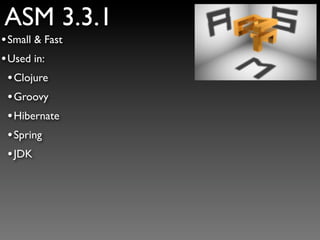


![Interface
ClassVisitor
Byte
Class Class
.class file Adapters code as
Reader Writer
byte[]
Read / Invoke Invoke
Produce
Analyze API API](https://image.slidesharecdn.com/metaprogrammingjava-110912134122-phpapp02/85/Have-Your-Cake-and-Eat-It-Too-Meta-Programming-Techniques-for-Java-28-320.jpg)
![Reader: parse bytecode, invoke
methods on ClassVisitor
ClassReader reader = new ClassReader("com.example.MyClass");
ClassWriter writer = new ClassWriter(reader, 0);
ClassVisitor visitor = new AddFieldAdapter(writer, ACC_PRIVATE,
"invokeCount", "I");
reader.accept(visitor, 0); Adaptor: Sits between
Reader & Writer
byte[] bytecode = writer.toByteArray();
Writer: methods construct bytecode](https://image.slidesharecdn.com/metaprogrammingjava-110912134122-phpapp02/85/Have-Your-Cake-and-Eat-It-Too-Meta-Programming-Techniques-for-Java-29-320.jpg)






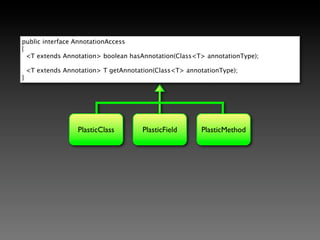




![Introduce Method
public interface PlasticClass {
Set<PlasticMethod> introduceInterface(Class interfaceType);
PlasticMethod introduceMethod(MethodDescription description);
PlasticMethod introduceMethod(Method method);
PlasticMethod introducePrivateMethod(String typeName,
String suggestedName,
String[] argumentTypes,
String[] exceptionTypes);
public interface PlasticMethod {
…
PlasticMethod addAdvice(MethodAdvice advice);](https://image.slidesharecdn.com/metaprogrammingjava-110912134122-phpapp02/85/Have-Your-Cake-and-Eat-It-Too-Meta-Programming-Techniques-for-Java-41-320.jpg)




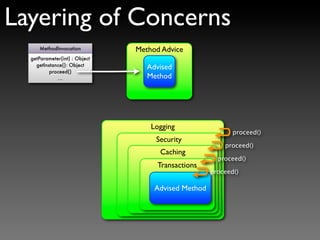


![public class MemoizeAdvice implements MethodAdvice {
private final Map<MultiKey, Object> cache = new HashMap<MultiKey, Object>();
public void advise(MethodInvocation invocation) {
MultiKey key = toKey(invocation); Not thread safe
if (cache.containsKey(key)) {
invocation.setReturnValue(cache.get(key));
return;
}
invocation.proceed();
invocation.rethrow();
cache.put(key, invocation.getReturnValue()); Memory leak
}
private MultiKey toKey(MethodInvocation invocation) {
Object[] params = new Object[invocation.getParameterCount()];
for (int i = 0; i < invocation.getParameterCount(); i++) {
params[i] = invocation.getParameter(i);
}
Assumes parameters are
return new MultiKey(params); immutable, implement
}
}
equals() and hashCode()](https://image.slidesharecdn.com/metaprogrammingjava-110912134122-phpapp02/85/Have-Your-Cake-and-Eat-It-Too-Meta-Programming-Techniques-for-Java-49-320.jpg)


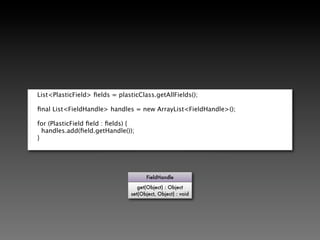


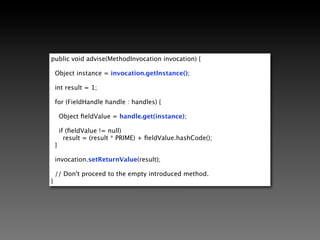


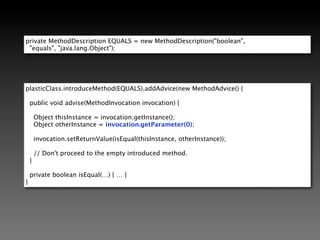




![Testing with Spock
class EqualsHashCodeTests extends Specification {
PlasticManagerDelegate delegate = The delegate manages one
new StandardDelegate(new EqualsHashCodeWorker()) or more workers
PlasticManager mgr = PlasticManager.withContextClassLoader()
.packages(["examples.plastic.transformed"])
.delegate(delegate)
.create();
Only top-level classes in example.plastic.transformed
are passed to the delegate
ClassInstantiator instantiator = mgr.getClassInstantiator(EqualsDemo.class.name)
examples.plastic.transformed.EqualsDemo
http://code.google.com/p/spock/](https://image.slidesharecdn.com/metaprogrammingjava-110912134122-phpapp02/85/Have-Your-Cake-and-Eat-It-Too-Meta-Programming-Techniques-for-Java-63-320.jpg)













